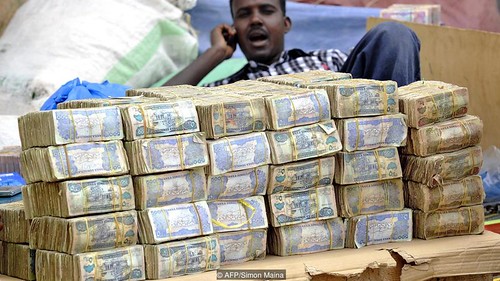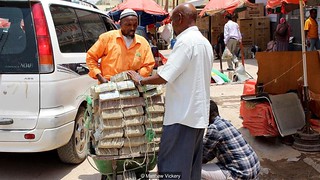
PREV ARTICLE
NEXT ARTICLE
FULL ISSUE
PREV FULL ISSUE
SOMALILAND IS NEARLY CASHLESSDick Hanscom of Alaska forwarded this BBC article about one nearly cashless society in Africa. Some great hyperinflation photos. -Editor
 Half a dozen men crowd round one of the many small colourful wooden shacks off a main street in Hargeisa, Somaliland, shouting and arguing over the quality of khat – a mild narcotic that has been likened to both coffee and cocaine – that they've just been hastily handed by the vendor. Customers quickly come and go, grabbing bundles of the green leafy, legal plant that they deem good enough before punching digits into phones and disappearing as quickly as they came. "We need to do everything quickly, and paying with cash here is slow," Omar, one of the khat sellers says as he chews on the green leafy plant himself. "It keeps people calm if they can get their khat quickly." No cash is transferred, and there's not a credit card in sight. But customers haven't got their daily khat fix for free; they've paid using their mobiles, transferring money on the sandy Somali street in seconds with little more than a mobile phone and a few numbers. There are not many things tiny Somaliland can claim to be a world leader in, but cashless payments might be one. This shift away from cash is in part due to the rapid devaluing of the Somaliland shilling, the breakaway self-declared republic's own currency which now trades at around 1 USD to 9,000 shillings. A few years ago it was just half that. Somaliland broke away from Somalia in 1991 at the start of the country's deadly civil war – a conflict that has continued in different forms to this day. The shilling also experienced a turbulent beginning. Introduced in 1994 it was widely used to finance weapons and the region's war against armed groups, before later being printed on demand by officials to further political aims in the breakaway republic, resulting in an almost constant devaluing of the currency year by year. With denominations of 500 and 1,000 being the most common, just paying for a few groceries can require a wad of notes, while a medium-sized transaction requires a bag stuffed with the currency.
With no internationally recognised banks, no formal banking system and ATMs somewhat an alien concept, two private companies – Zaad which was launched in 2009, and the newer e-Dahab – have filled the void creating a mobile banking economy where money is deposited through the companies and stored on phones, allowing items to be bought and sold with personalised numbers. To read the complete article, see: Wayne Homren, Editor The Numismatic Bibliomania Society is a non-profit organization promoting numismatic literature. See our web site at coinbooks.org. To submit items for publication in The E-Sylum, write to the Editor at this address: whomren@gmail.com To subscribe go to: https://my.binhost.com/lists/listinfo/esylum All Rights Reserved. NBS Home Page Contact the NBS webmaster 
|
